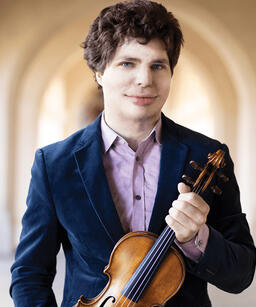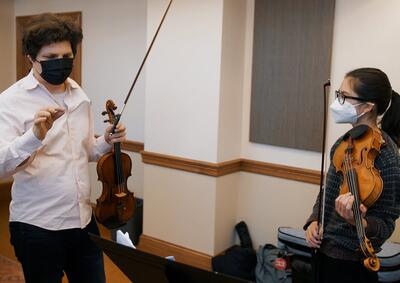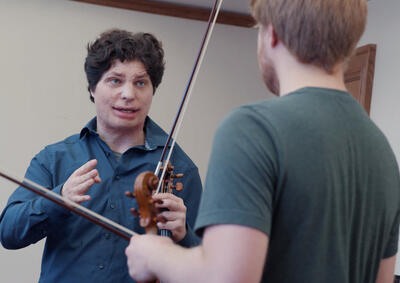When studying the violin, or any other instrument for that matter, it is essential to know and understand not only one's own part, but the whole score. Putting down the violin and thinking about music away from the instrument has become an essential part of my work and when I teach, I encourage students to reserve time to think analytically about the music they are playing, in order to improve not only how to play the violin, but also why the music was written the way it was, and what it should say. My role in teaching is not only to help with violin-centered technique and advice, but also to serve as a guide in the process of students finding what they want to say to the world as artists.
Augustin Hadelich
When studying the violin, or any other instrument for that matter, it is essential to know and understand not only one's own part, but the whole score. Putting down the violin and thinking about music away from the instrument has become an essential part of my work and when I teach, I encourage students to reserve time to think analytically about the music they are playing, in order to improve not only how to play the violin, but also why the music was written the way it was, and what it should say. My role in teaching is not only to help with violin-centered technique and advice, but also to serve as a guide in the process of students finding what they want to say to the world as artists.
Augustin Hadelich has established himself as one of the major violinists of our time. After winning the Gold Medal at the 2006 International Violin Competition of Indianapolis, concerto and recital appearances on many of the world’s top stages quickly followed. He has been honored with such awards as the Avery Fisher Career Grant (2009), Borletti-Buitoni Trust Fellowship in the UK (2011), and the inaugural Warner Music Prize (2015). His accomplishments were further recognized in 2018 when Musical America named him its Instrumentalist of the Year.
“The essence of Hadelich’s playing,” The Washington Post has opined, “is beauty: reveling in the myriad ways of making a phrase come alive on the violin, delivering the musical message with no technical impediments whatsoever, and thereby revealing something from a plane beyond ours.” The New York Times described Hadelich as a “riveting storyteller” after his world-premiere performance of YSM faculty composer David Lang’s mystery sonatas.
Hadelich’s appearances as a soloist include guest engagements with the most celebrated ensembles in the world, including the Academy of St. Martin in the Fields, Berlin Philharmonic, Boston Symphony Orchestra, Chicago Symphony Orchestra, Cleveland Orchestra, Finnish Radio Orchestra, Los Angeles Philharmonic, New York Philharmonic, Mozarteum Orchestra Salzburg, NHK Symphony Orchestra (Tokyo), Oslo Philharmonic, Philadelphia Orchestra, Royal Concertgebouw Orchestra, San Francisco Symphony, and São Paulo Symphony Orchestra, as well as the radio orchestras of Cologne, Frankfurt, Hamburg, and Stuttgart, among others. Hadelich’s discography includes solo, chamber, and concerto recordings with the Bavarian Radio Orchestra, London Philharmonic Orchestra, Norwegian Radio Orchestra, and Royal Liverpool Philharmonic Orchestra. His recording with the Seattle Symphony of Dutilleux’s violin concerto L’arbre des songes won a 2016 Grammy Award in the Best Classical Instrumental Solo Category.
Hadelich teaches a limited number of violinists at the Yale School of Music and gives master classes for all YSM string players. He has held residencies at the Colburn School, Curtis Institute of Music, and Kronberg Academy and given master classes at the Aspen Music Festival and School, the University of Cincinnati’s College-Conservatory of Music, Indiana University’s Jacobs School of Music, the Manhattan School of Music, and the University of Music and Performing Arts in Munich.
Born in Italy to German parents, Hadelich earned a diploma in violin from the Istituto Mascagni in Livorno, Italy, and a graduate diploma and an artist diploma from The Juilliard School.





